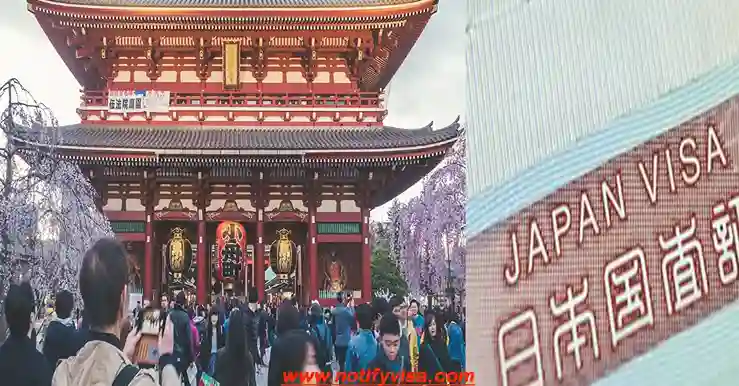This Notifyvisa website has complete details about Japan’s launch of an eVisa system for tourists from 11 countries. The Japanese Ministry of Foreign Affairs has launched a new electronic visa (eVisa) system for tourists from 12 countries. This makes the application process easier and allows for short-term stays. The eVisa permits a single entry for tourism for up to 90 days, with specific rules for Chinese and Vietnamese nationals.
Read: Common Mistakes to Avoid When Applying for a Schengen Visa
The new electronic visa (eVisa) system from the Japanese Ministry of International Affairs is now accessible to qualified international visitors looking to go to Japan for a brief stay. This digital innovation will go into effect on July 23, 2024, to simplify the visa application procedure and increase accessibility to Japan.
Japan Launches eVisa System Eligible Countries:
Foreign nationals living in the following nations can apply for a Japan eVisa:
- Australia
- Brazil
- Cambodia
- Canada
- Saudi Arabia
- Singapore
- South Africa
- Taiwan
- United Arab Emirates
- United Kingdom
- United States
Through the Japan eVisa system, these tourists can now apply for and obtain their visas online. The system is accessible to anyone with regular passports, but it’s crucial to remember that e-visas can only be obtained for air travel at this time.
Procedure for Applications and Their Needs:
The new procedure requires applicants to apply online for their visas, and they are only qualified if they are taking a plane trip with a regular passport.
The majority of the application procedure can be finished online, but in certain cases, candidates might need to physically show up for an interview at the closest Japanese embassy or consulate.
Comprehensive eVisa Guidelines:
Most qualified nations can enter Japan once with a Japan eVisa and stay for up to 90 days. For Chinese and Vietnamese nationals, there are, nevertheless, special rules. Vietnamese nationals living in Vietnam are eligible for stays of up to 15 days, whereas Chinese persons living in China can apply for eVisas for stays of up to 15 or 30 days.
Travellers holding an electronic visa are required to show a “visa issuance notice” in digital format at the airport upon arrival in Japan. Please be aware that printed copies, screenshots, and PDF data will not be accepted.
Authorization for Future Travel in the Event of a Visa Exemption:
Japan intends to implement an electronic travel authorization system for visa-exempt travellers in addition to the eVisa system. The purpose of this new rule is to improve security and stop unauthorized stays.
Before entering Japan, tourists without a visa must electronically submit their travel itinerary, which includes their personal information and the reason for their visit. Anticipated for implementation in 2025, this regulation is a component of Japan’s larger endeavors to fortify its admission protocols.
Japan Issues Visas for 2023:
Compared to the 1.4 million visas granted in 2022, Japan issued 4.1 million visas in 2023, a considerable rise. 2.4 million of these, or 58% of the total, were granted to citizens of China. Even with this increase, the quantity is still less than in 2019, before the outbreak, when 8.2 million visas were given by Japan.
Conclusion:
Japan has taken a big step towards modernizing its travel laws and increasing its accessibility to foreign visitors with the introduction of the eVisa system.
Japan continues to improve security and accelerate entrance procedures to provide a more efficient and safe travel experience for all tourists. This includes the impending deployment of electronic travel authorizations for visa-exempt travellers.




One thought on “Japan Launches eVisa System for Tourists from 11 Countries”